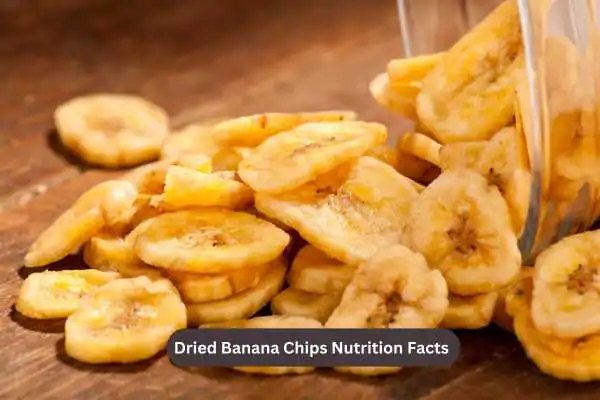Bananas are one of the most popular fruits worldwide, valued for their natural sweetness and nutritional benefits. But when bananas are dried and transformed into crunchy banana chips, their nutritional profile changes significantly. While dried banana chips can be a convenient snack, it’s important to understand what you’re really eating.

In this article, we’ll explore the nutrition facts of dried banana chips, highlight their health benefits, and discuss potential drawbacks so you can make informed choices about including them in your diet.
What Are Dried Banana Chips?
Dried banana chips are made by slicing ripe bananas and either deep-frying them in oil or dehydrating them at low heat. The method used has a direct impact on their nutrition. Dehydrated chips tend to retain more natural nutrients, while fried versions are often higher in calories and fats due to added oil and sugar.
In the UK, most commercially available banana chips are fried and sweetened, making them more of a treat than a health food. However, unsweetened dehydrated banana chips are becoming more accessible in health food shops and online.
Nutritional Profile of Dried Banana Chips
The following nutrition values are based on a 100g serving of fried banana chips (approximate values may vary by brand):
-
Calories: 520–530 kcal
-
Carbohydrates: 58–60g
-
Sugars: 25–30g
-
Dietary Fibre: 7–8g
-
Protein: 2–3g
-
Fat: 33–35g (of which saturated fat is 28–29g)
-
Potassium: 500–550mg
-
Magnesium: 70–80mg
-
Vitamin B6: Trace amounts
As shown, dried banana chips are energy-dense, with high fat and sugar content compared to fresh bananas. While they still provide fibre and essential minerals like potassium and magnesium, the frying process often overshadows these benefits.
Health Benefits of Dried Banana Chips
Despite being calorie-heavy, banana chips do have some nutritional positives worth considering:
1. Rich in Dietary Fibre
Banana chips contain around 7–8g of fibre per 100g. Fibre supports digestive health, promotes fullness, and helps regulate blood sugar levels when consumed in moderation.
2. Good Source of Potassium
Potassium is essential for maintaining healthy blood pressure and supporting heart and muscle function. Banana chips deliver about 10% of the recommended daily intake per serving.
3. Magnesium for Energy and Nerves
Magnesium contributes to energy production, muscle relaxation, and nerve function. Regular intake helps reduce fatigue and supports bone health.
4. Portable Energy Snack
Banana chips are lightweight, non-perishable, and convenient to carry, making them an ideal energy boost for outdoor activities, travelling, or long workdays.
Potential Drawbacks
While there are benefits, dried banana chips should be eaten in moderation. Here’s why:
1. High in Calories
With over 500 calories per 100g, banana chips can quickly contribute to weight gain if consumed in large portions. This is significantly more than fresh bananas, which have about 90 calories per 100g.
2. Excessive Saturated Fat
Most commercial banana chips are fried in coconut oil or palm oil, which are high in saturated fats. Too much saturated fat can increase LDL cholesterol levels, raising the risk of heart disease.
3. Added Sugars
Many brands add sugar or honey to enhance sweetness. This increases the overall sugar load, which can negatively impact blood sugar control and dental health.
4. Loss of Some Nutrients
The frying process can reduce heat-sensitive vitamins, particularly vitamin C and some B vitamins, lowering the nutritional value compared to fresh bananas.
Choosing Healthier Options
Not all banana chips are created equal. If you’re looking for healthier options in the UK, keep these tips in mind:
-
Opt for dehydrated versions instead of fried. These retain more nutrients and have lower fat content.
-
Check the ingredient list. Look for products with only bananas listed, with no added sugar, honey, or syrups.
-
Watch portion sizes. Stick to a small handful (about 30g) as a snack rather than consuming large amounts.
-
Consider homemade banana chips. You can dehydrate banana slices at home using an oven or food dehydrator without oils or added sugar.
How Do Dried Banana Chips Compare to Fresh Bananas?
Fresh bananas are lower in calories, naturally fat-free, and higher in vitamin C and water content, making them more filling. Dried banana chips, on the other hand, are calorie-dense and provide a crunchier, snack-like alternative.
If your goal is weight management or heart health, fresh bananas are the better choice. However, if you need a portable, energy-rich snack for hiking or travel, banana chips may be more practical.
Final Thoughts
Dried banana chips may seem like a healthy alternative to crisps or sweets, but their nutritional profile tells a more complex story. They are high in calories, saturated fat, and sometimes added sugars, but they also provide fibre, potassium, and magnesium.
The key is moderation. Enjoy banana chips occasionally as a treat or energy booster, but rely on fresh bananas for everyday nutrition. If possible, choose unsweetened, dehydrated versions or make your own at home for a healthier option.
By understanding the nutrition facts of dried banana chips, you can make smarter snack choices that align with your health and lifestyle goals in the UK.

